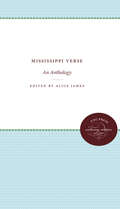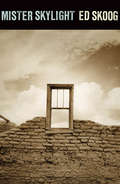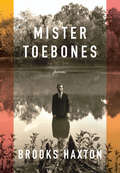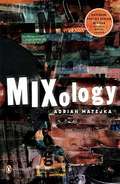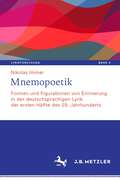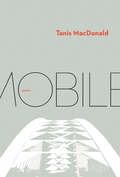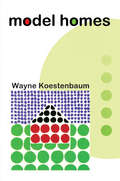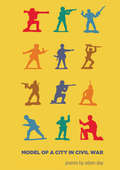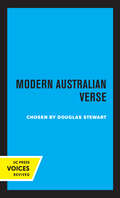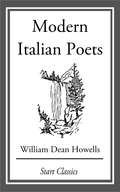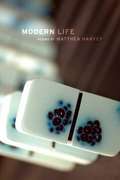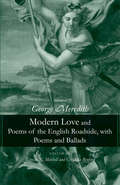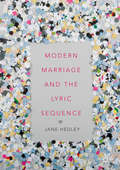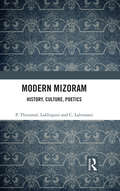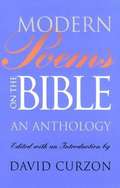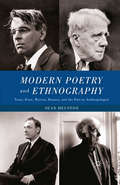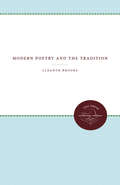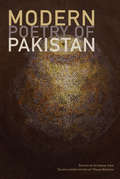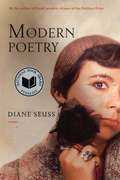- Table View
- List View
Mississippi Verse: An Anthology
by Alice JamesThis volume contains poems by: Almond, Austin, Gaine, Baringer, Blundell, Brackin, Braswell, Brown, Burnett, Cameron, Champenois, Clark, Cooper, Creekmore, Faulkner, Gibson, Gladden, Graham, Hammett, Harned, Holme, Hudson, Jackson, Lee, Legg, McFarlane, McGill, Mellen, Newson, O'Donnell, Percy, Ragsdale, Reid, Soper, Starke, West, Whitehead, Wrinn, Young, and Zeller.Originally published in 1934.A UNC Press Enduring Edition -- UNC Press Enduring Editions use the latest in digital technology to make available again books from our distinguished backlist that were previously out of print. These editions are published unaltered from the original, and are presented in affordable paperback formats, bringing readers both historical and cultural value.
Mister Skylight
by Ed Skoog"Skoog's first full-length collection captures and presents the truth of the truth: our under-analyzed, overlooked, often fragile existences on earth."--Dave Jarecki"Skoog's use of language is disorientating, vivid and surprising, all the things I love about great poetry."--Nathan Moore"Ed Skoog purposefully blindfolds us, spins us around and dares us to find a target. He wants us to be unbalanced in our interaction with the work; he wants our experience to be unsettling, for the writing to 'arrive like a hostage, an ear, a finger in the mail' (from 'Party at the Dump')."--Carolee SherwoodThe Stranger writes, "Ed Skoog's poetry is so ambitious it takes my breath away.. he knows how to braid pop culture into small personal melancholies and into large generosities."X. J. Kennedy writes, "This is the damnedest book. I love it like crazy. Skoog is a dazzling new talent who not only promises, but achieves."The phrase "Mister Skylight" is an emergency signal to alert a ship's crew, but not its passengers, of an emergency. This debut collection is alert to disasters--the flooding of New Orleans and the wildfires of California--and also to the hope of rescue. Interior dramas of the self are played out in a clash of poetic traditions, exuberant imagery, and wild metaphor.Ed Skoog, who worked for years in the basement of a museum in New Orleans, developed personal connections to objects and paintings. "Working on an exhibition about the building trades was important to this book," he writes. "Spending weeks listening to the oral histories of plasterers, steeplejacks, and carpenters connected me to my own family's stories." Marked by uncommonly intense and considered use of language, Skoog demonstrates a rich attention to form and allusive narrative as he attends to the details of contemporary politics, culture, place, and relationships.. . . Not to be the one who left is to live in an alarm.The unstraightened bed.But don't I always bring bright souvenirs from our travels,a feather, a coin, a bee? Astonishing in my palm.Minutes past your touch, what our bodies wereis disappearing like a ship caught in polar ice.Ed Skoog was born in Topeka, Kansas, in 1971. He earned degrees from Kansas State University and the University of Montana. His poems have been published in many magazines, including Poetry, American Poetry Review, and The Paris Review. He lives in Seattle.
Mister Toebones: Poems
by Brooks HaxtonIn these marvelous pages, the award-winning poet turns a searching gaze toward the shared habitat and intertwined fates of man and animal. He looks back and forward in time, down at the soil, up at the stars, and deeply into his personal relationships.Brooks Haxton has been writing for years about the connections between human beings and the creatures we find fascinating. Mister Toebones, his new collection, draws its title from a nickname Haxton gives to a daddy longlegs he sees at his father's grave. In another poem, the poet and his mother, in search of a swimming hole, find a copperhead rearing to strike, about to birth its live young. Elsewhere, waist-deep in the Mississippi River, under the Atlantic Ocean, on the cracked ice of a frozen pond, even in outer space, the poet explores regions and forces that seem past endurance. Taking stock of threats against human survival, our own recklessness chief among them, these poems seek among visionaries and despots, scientific prodigies, murderers, and lovers what vitality may come from an alertness to all living things.
Mitti Ke Manav
by Jay Shankar TripathiThe poet has shown the state of the village Ahcalpur through his poem. The village is surrounded by hills and a river. The poet has made the villagers and farms the medium of the poem.
Mixology
by Adrian MatejkaSelected for the 2008 National Poetry Series by Kevin Young The poems in Adrian Matejka's second collection, Mixology, shapeshift through the myriad meanings of "mixing" to explore and explode ideas of race, skin politics, appropriation, and cultural identity. Whether the focus of the individual poems is musical, digital, or historical, the otherness implicit in being of more than one racial background guides Matejka's work to the inevitable conclusion that all things-no matter how disparate-are parts of the whole.
Mnemopoetik: Formen und Figurationen von Erinnerung in der deutschsprachigen Lyrik der ersten Hälfte des 19. Jahrhunderts (Lyrikforschung. Neue Arbeiten zur Theorie und Geschichte der Lyrik #4)
by Nikolas ImmerIn der ersten Hälfte des 19. Jahrhunderts avanciert die Erinnerung zu einem zentralen Gegenstand der deutschsprachigen Lyrik. Das bislang in der Forschung weitgehend marginalisierte Genre der Erinnerungslyrik wird in der vorliegenden Arbeit erstmals systematisch erschlossen. Die Untersuchung ist zum einen auf die lyrische Inszenierung von Erinnerungsakten, -orten und -objekten ausgerichtet. Zum anderen wird diskutiert, inwieweit sich insbesondere in der Geschichts-, Denkmals- und Trauerlyrik erinnerungspoetische Formationen herausbilden. Die künstlerisch anspruchsvollen und zeitreflexiven Erinnerungsgedichte August von Platens und Eduard Mörikes werden in zwei eigenständigen Fallstudien behandelt.
Mobile
by Tanis MacDonaldMobile is an uncivil feminist reboot of Dennis Lee's Civil Elegies and Other Poems; an urban lament about female citizenship and settler culpability; an homage to working and walking women in a love/hate relationship with Toronto, its rivers and creeks, its sidewalks and parks, its history, misogyny and violence. How do we, in Lee's words, see the "lives we had not lived" that "invisibly stain" the city? What are the sexual politics of occupying space in a city, in a workspace, in history? How can we name our vulnerabilities and our disasters and still find strength?Written in a slippery mix of lyric and experimental styles, Mobile is MacDonald's grouchiest book yet.
Mobile
by Tanis MacDonaldLonglisted for the 2020 Toronto Book AwardsMobile is an uncivil feminist reboot of Dennis Lee's Civil Elegies and Other Poems; an urban lament about female citizenship and settler culpability; an homage to working and walking women in a love/hate relationship with Toronto, its rivers and creeks, its sidewalks and parks, its history, misogyny and violence. How do we, in Lee's words, see the "lives we had not lived" that "invisibly stain" the city? What are the sexual politics of occupying space in a city, in a workspace, in history? How can we name our vulnerabilities and our disasters and still find strength?Written in a slippery mix of lyric and experimental styles, Mobile is MacDonald's grouchiest book yet.Praise for Tanis MacDonald:"These poems performatively perturb our complacencies: toward city, land, plant, women, and men. With her sybil voice full of sass but never lacking civility, MacDonald forages the city for women's lives and names, knocking not on heaven's door but on the tombs where our world is heading. Confronting barriers of attitude and structure that women face daily, full of sounds and verve, Mobile is a deft counterpoint to Dennis Lee's long-ago Civil Elegies. Pick up this Mobile, readers; it?s ringing and it's no robocall!" —Erín Moure"With delightfully subversive wordplay and intertextual sleight of hand, Tanis MacDonald wanders the text of the modern city, exploring its civil energies with intelligence, incision, compassion, music, ferocity and wit. A Sibyl's elegies for the civil legacies of the past, these feisty poems interrogate the mansplaining streets, finding the always-there voices and experiences of women in its architecture and shadows, curbs and enthusiasms, structures and strictures, its texts and traditions, violence and vibrance, twists and d�tournes. Go with MacDonald as she guides you through the streets of Mobile. It's a tour de force." —Gary Barwin
Model Homes (American Poets Continuum #Vol. 87)
by Wayne KoestenbaumWayne Koestenbaum knows how to drop the language in the blender of the imagination and hit frappe! The 13 ottava rima cantos in Model Homes present a neo-Freudian tale of the goings-on in the poet’s present home and various events from his childhood. Modulating a voice that is urbane and ribald, melancholic and wry, Koestenbaum puts a memorable spin on the status quo notion of domestic arrangements.Wayne Koestenbaum holds a Ph.D. in English from Princeton University. He was co-winner of the 1989 Discovery/The Nation poetry contest, has published three books of poetry and three books of prose, and writes frequently for The New York Times Magazine, The London Review of Books and other periodicals. He lives in New York, NY.
Model of a City in Civil War
by Adam DayMen carry a mattress retrieved from a dumpster past the flooded foundations of an unfinished high-rise, an old woman catches a pigeon in the folds of her dress the dead smile and rise from swimming pools or stand at attention on stamps. The landscape can't believe it's real—there is no ground beneath it, like what mirrors do. Adam Day is the recipient of fellowships from the Poetry Society of America and Kentucky Arts Council, and a PEN Emerging Writers Award. His work has appeared in Boston Review, the Kenyon Review, American Poetry Review, AGNI, the Iowa Review, and others.
Modern Australian Verse: Modern Australian Verse (Poetry in Australia)
by Douglas StewartThis title is part of UC Press's Voices Revived program, which commemorates University of California Press’s mission to seek out and cultivate the brightest minds and give them voice, reach, and impact. Drawing on a backlist dating to 1893, Voices Revived makes high-quality, peer-reviewed scholarship accessible once again using print-on-demand technology. This title was originally published in 1965.
Modern Indian Literature, An Anthology: Surveys and Poems (Volume #1)
by K. M. GeorgeModern Indian Literature an Anthology comes in three volumes and this is the first volume on surveys and poems.
Modern Indian Poetry in English
by K. Ayyappa PanikerThis anthology comprises selections from poems of some of the famous Indian poets.
Modern Italian Poets
by Jacob BlakesleyIn 1948, the poet Eugenio Montale published his Quaderno di traduzioni and created an entirely new Italian literary genre, the "translation notebook." The quaderni were the work of some of Italy's foremost poets, and their translation anthologies proved fundamental for their aesthetic and cultural development.Modern Italian Poets shows how the new genre shaped the poetic practice of the poet-translators who worked within it, including Giorgio Caproni, Giovanni Giudici, Edoardo Sanguineti, Franco Buffoni, and Nobel Prize-winner Eugenio Montale, displaying how the poet-translators used the quaderni to hone their poetic techniques, experiment with new poetic metres, and develop new theories of poetics.In addition to detailed analyses of the work of these five authors, the book covers the development of the quaderno di traduzioni and its relationship to Western theories of translation, such as those of Walter Benjamin and Benedetto Croce. In an appendix, Modern Italian Poets also provides the first complete list of all translations and quaderni di traduzioni published by more than 150 Italian poet-translators.
Modern Italian Poets: Essays and Versions
by William Dean HowellsWilliam Dean Howells (1837-1920) was an American realist author and literary critic. He wrote his first novel, Their Wedding Journey, in 1871, but his literary reputation really took off with the realist novel A Modern Instance, published in 1882, which describes the decay of a marriage. His 1885 novel The Rise of Silas Lapham is perhaps his best known, describing the rise and fall of an American entrepreneur in the paint business. His social views were also strongly reflected in the novels Annie Kilburn (1888) and A Hazard of New Fortunes (1890). While known primarily as a novelist, his short story "Editha" (1905) - included in the collection Between the Dark and the Daylight (1907) - appears in many anthologies of American literature. Howells also wrote plays, criticism, and essays about contemporary literary figures such as Ibsen, Zola, Verga, and, especially, Tolstoy, which helped establish their reputations in the United States. He also wrote critically in support of many American writers. It is perhaps in this role that he had his greatest influence.
Modern Life
by Matthea HarveyMatthea Harvey's "Modern Life" introduces a new voice that tries to exist in the gray area between good and evil, and love and hate, in her poems.
Modern Love and Poems of the English Roadside, with Poems and Ballads
by George Meredith Criscillia Ann Benford Rebecca N. MitchellModern Love and Poems of the English Roadside occupies a distinctive and somewhat notorious place within George Meredith's already unique body of work. Modern Love is now best known for the emotionally intense sonnet cycle which Meredith's own contemporaries dismissed as scandalously confessional and indiscreet. While individual sonnets from the work have been anthologized, the complete cycle is rarely included and the original edition has not been reprinted since its first appearance in 1862. This edition restores the original publication and supplements it with a range of accompanying materials that will re-introduce Meredith's astonishing collection of poetry to a new generation of readers.
Modern Marriage and the Lyric Sequence
by Jane HedleyModern Marriage and the Lyric Sequence investigates the ways in which some of our best poets writing in English have used poetic sequences to capture the lived experience of marriage. Beginning in 1862 with George Meredith’s Modern Love, Jane Hedley’s study utilizes the rubrics of temporality, dialogue, and triangulation to bring a deeply rooted and vitally interesting poetic genre into focus. Its twentieth- and twenty-first-century practitioners have included Edna St. Vincent Millay, Robert Lowell, Rita Dove, Eavan Boland, Louise Glück, Anne Carson, Ted Hughes, Claudia Emerson, Rachel Zucker, and Sharon Olds. In their poetic sequences the flourishing or failure of a particular marriage is always at stake, but as that relationship plays out over time, each sequence also speaks to larger questions: why we marry, what a marriage is, what our collective stake is in other people’s marriages. In the book’s final chapter gay marriage presents a fresh testing ground for these questions, in light of the US Supreme Court’s affirmation of same-sex marriage.
Modern Mizoram: History, Culture, Poetics
by P. Thirumal Laldinpuii C. LalrozamiMizoram is situated at a unique cusp in North East India, in terms of both physical and social contexts. It shares its borders with Myanmar and Bangladesh, while cultural influences range from the indigenous to the Western. This book offers an alternative understanding of the modern history of Mizoram through an analysis of its cultural practices through language, music, poetry and festivals. It explores the roots of modern cultural works not just in Christianity, but also in precolonial Mizo traditional practices. The authors closely examine text, performance and sculptural images, including the first handwritten newspaper Mizo Chanchin Laisuih (1898) and the Puma Zai festival (1907–11) from the early colonial period along with a contemporary sculptural image. They argue that cultural works open up to new forms of interpretations and responses over time. The book indicates that the Mizo creative sensibility enmeshed in theological, capitalistic-material and political/ideological regimes informs its modern enclosures, be it region, religion or nation. This book will be of great interest to scholars and researchers of cultural studies, literature, media, history, politics, sociology and social anthropology, area studies, North East India studies and South Asian studies.
Modern Poems on the Bible, An Anthology (Second Edition)
by David CurzonA collection of some of the most imaginative and engaging responses to the Bible written in this century. Guided by the classic rabbinic genre of Midrash Curzon chooses masterpieces of 20th Century poetry and places them beside the biblical passages that were their inspiration.
Modern Poems: An Introduction to Poetry
by Richard Ellmann Robert O'ClairAnthology designed for undergraduate poetry courses. Drawn from modern verse in English, covering Walt Whitman to the present.
Modern Poetry and Ethnography
by Sean HeustonThis study maps a new approach to the works of W. B. Yeats, Robert Frost, Robert Penn Warren, and Seamus Heaney. Sean Heuston combines interdisciplinary analysis, specifically ethnography, with close reading, and in so doing argues provocatively for the intersection of modern poetry studies and contemporary ethnographic theory.
Modern Poetry and the Tradition
by Cleanth BrooksThis study presents the revolutionary thesis that English poetry and poetic theory were deflected from their richest line of development by the scientific rationalism that came with Hobbes and has continued its restrictive influence to the present day, when such poets as Yeats and Eliot have begun the reestablishment of the earlier line of development.Originally published in 1939.A UNC Press Enduring Edition -- UNC Press Enduring Editions use the latest in digital technology to make available again books from our distinguished backlist that were previously out of print. These editions are published unaltered from the original, and are presented in affordable paperback formats, bringing readers both historical and cultural value.
Modern Poetry of Pakistan
by Iftikhar Arif Waqas KhwajaModern Poetry of Pakistan brings together not one but many poetic traditions indigenous to Pakistan, with 142 poems translated from seven major languages, six of them regional (Baluchi, Kashmiri, Panjabi, Pashto, Seraiki, and Sindhi) and one national (Urdu). Collecting the work of forty-two poets and fifteen translators, this book reveals a society riven by ethnic, class, and political differences--but also a beautiful and truly national literature, with work both classical and modern, belonging to the same culture and sharing many of the same concerns and perceptions.
Modern Poetry: Poems
by Diane SeussDiane Seuss’s signature voice—audacious in its honesty, virtuosic in its artistry, outsider in its attitude—has become one of the most original in contemporary poetry. Her latest collection takes its title, Modern Poetry, from the first textbook Seuss encountered as a child and the first poetry course she took in college, as an enrapt but ill-equipped student, one who felt poetry was beyond her reach. Many of the poems make use of the forms and terms of musical and poetic craft—ballad, fugue, aria, refrain, coda—and contend with the works of writers overrepresented in textbooks and anthologies and those too often underrepresented. Seuss provides a moving account of her picaresque years and their uncertainties, and in the process, she enters the realm between Modernism and Romanticism, between romance and objectivity, with Keats as ghost, lover, and interlocutor.In poems of rangy curiosity, sharp humor, and illuminating self-scrutiny, Modern Poetry investigates our time’s deep isolation and divisiveness and asks: What can poetry be now? Do poems still have the capacity to mean? “It seems wrong / to curl now within the confines / of a poem,” Seuss writes. “You can’t hide / from what you made / inside what you made.” What she finds there, finally, is a surprising but unmistakable love.
